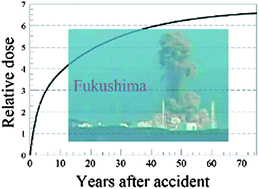Accounting for long-term doses in “worldwide health effects of the Fukushima Daiichi nuclear accident”†
Abstract
Radiocesium isotopes have been known to dominate projections for extra cancers expected years after a release of radioactivity from a severely damaged reactor. Presumably, the same will be true for the cancer consequences from the Fukushima nuclear accident of March 2011, but long-term doses from radiocesium in the environment were not considered in an estimate by Ten Hoeve and Jacobson (TH&J). (The purpose of their article was to evaluate the contention that the accident would have no health effects.) As a result, the projection by TH&J of 125 future cancer-related mortalities worldwide (range 15 to 1100) appears to be an underestimate. Some other factors in their calculation tended to overestimate consequences. On balance, the net result of adjusting the TH&J numbers to account for long-term dose from radiocesium is uncertain, but the mid-range estimate for the number of future mortalities is probably closer to 1000 than to 125.


 Please wait while we load your content...
Please wait while we load your content...